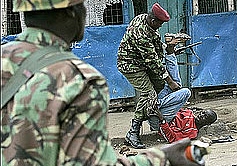Conflict between the Regular & AP Police Forces: Myth or Reality?

The media is abuzz with reports of an apparent conflict between the regular police and their Administration police counterparts over allocation of resources and overlapping mandate. Is this conflict real or imaginary?
 |
| Police in action Photo courtesy |
The situation persists to date and section 108 of the Constitution ranks the regular police higher than the Administration Police in the hierarchy of the disciplined forces. The Commissioner of Police is a constitutional office holder answerable to the President whereas the Commandant of the Administration Police is a mere delegate of the Minister of State for Internal Security and Provincial Administration who is statutorily the commandant of the AP under section 3(2) of the Administration Police Act.
The regular police have an extensive mandate of enforcing all laws and regulations, protecting life and property, preserving peace, preventing and detecting crime and apprehending offenders to maintain law and order in the Kenya. On the other hand the APs main role is assisting government officers (read provincial administrators and other civil servants) in the execution of their lawful duties, preservation of public peace and national defence in the event of war or an emergency. The AP has a limited role in the prevention of crime and apprehension of offenders. Then how do their mandates overlap?
Section 2 of the Criminal Procedure Code, Chapter 75 Laws of Kenya provides in that a “Police Officer" means a Police officer or an Administration Police officer. The Penal Code, Chapter 63 Laws of Kenya stipulates that 'Police Force' includes the force defined in section 2 of the Police Act, and the Administration Police Force established under the Administration Police Act; and the term "Police Officer' shall be construed accordingly.
Section 89 (4) of the Criminal procedure Code empowers police officers to prepare and sign a formal charge or complaint for commence criminal proceedings before a magistrate. Although section 19 of the Police Act and section 9 of the Administration Police Act authorise officers from the two forces to charge criminal offenders, this role is traditionally performed by the regular police who also formally investigate crime. The APs do not investigate crime and their role of preventing commission of offences and apprehension of offenders is auxiliary rather than conflicting to that of the regular police.
Why are the two forces feuding ?
Different historical, philosophical and operational foundations and the rapid transformation of the AP are the real issues underlying the perceived conflict. Formed in 1929 as a district based tribal outfit to assist colonial administrators in the collection of tax revenue and prosecution of criminal cases before the Native Courts, the Administration Police (APs) force has over the years been transformed into a professional entity with a dominant national presence. The APs are now organised into easily deployable agile and flexible units which make them common all over the country. They are well spread out in the rural areas where they provide back up to the provincial administration. Their presence in rural villages and urban slums where they work hand in hand with chiefs provides an all pervading sense of security to underprivileged communities.
APs also play the role of a territorial army in far-flung marginal pastoral areas and border districts. They live with the people and are well equipped and attuned to provide basic security and resolve minor social disputes. More and more communities are now turning to the administration police for assistance in dealing with serious offences such as armed robbery and drug abuse. This is causing jitters in the regular police who think the APs tinkering with their territory.
In contrast, the regular police was greatly involved in the arrest, detention and suppression of African nationalists at the height of the struggle for independence. The force was similarly used in the 1980s and 1990s to crack down on political dissidents who were demanding greater freedoms in opposition to KANUs one party rule. Many intellectuals and current and former members of parliament were arrested, detained or hauled into courts late in the evening by the infamous Special Branch then a section the regular police.
The regular police are organised into rigid and reactive structures. They predominantly interact with the general public when carrying out arrests, responding to incidents of violent crime or quelling social and political unrest; tasks which they always perform ham-fisted. This history and management philosophy of the regular police has not endeared the force to the general public. The much touted community policing envisaged in the Kenya Police Strategic Plan (2003-2007) has essentially become a cropper since the general public has little or no trust and confidence in the regular police.
Pundits have argued that a merger of the two forces is the only panacea for this jostling over turf. This proposal is reactive, myopic and not strategic. Kenya is not the only country with law enforcement agencies that have overlapping mandates. The United States has well over 120 law enforcement agencies with the Federal Bureau of Investigations (FBI) and the Central Intelligence (CIA) being the most visible. The two agencies spar occasionally over turf and territory but this rarely gets into the public limelight owing to excellent managers who never let sibling rivalry by their minions get into the way of the overall objective of providing national security.
Strengthening the AP does not necessarily weaken the regular police since the two play very diverse albeit complimentary roles. The two units only require excellent managers who can provide strategic transformative leadership and resolve petty invidiousness between their operatives for the overall national good.
Capt. (Rtd) Collins Wanderi
Certified Fraud Examiner (CFE), Advocate and Commissioner for Oaths
